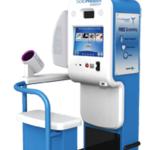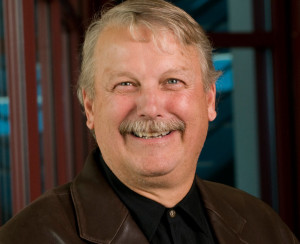SoloHealth Stations are in 3,200 retail stores nationwide and growing
There’s a hot new consumer health product working its way into pharmacies across the nation. Say goodbye to the ubiquitous self-serve blood pressure stations found next to the pharmacy counter. Say hello to the next generation of consumer self-serve health kiosks.
This trend may open a door for innovative clinical laboratories to add their service offerings to the kiosks in their communities. One example of the fast adoption of these new kiosks is the SoloHealth Station. SoloHealth has already placed its kiosks in 3,200 retail locations nationwide.
Each day, more than 130,000 individuals use them and, on average, each consumer spends 4.5 minutes per session, according to a report issued by Marketwatch.com.
Self-service Kiosks Offer a Health Tests and Preventive Information
These machines are replacing the self-service blood pressure machines commonly found in pharmacies. for years with the new blue and white devices, which can perform a range of health screenings, from blood pressure and vision and depression, as well as assess your risk for heart disease, calculate your body mass index offer friendly advice on diet, exercise habits, and an expanding list of health topics, noted a report published by the Minneapolis Star Tribune.

A next-generation of self-service health kiosk, The SoloHealth Station (pictured) is replacing self-service blood pressure machines commonly found in drugstores. It can perform a range of health screens and assess the user’s risk for heart disease, as well as provides preventive health advice and a list of local physicians and can schedule an appointment with a doctor. (Photo copyright SoloHealth)
Users answer on-screen questions about age, gender, allergies and potential symptoms, such as tingling in fingers and symptoms of depressions, then the machine tailors its preventive health answers, recommendations and advertisements to the user’s profile. Additionally, it provides a list of local physicians and offers to help schedule an appointment if something worrisome is detected during the user’s SoloHealth session.
The idea, 38-year-old Bart Foster, CEO & Founder of SoloHealth, said in the Star Tribune story, is to combine a few simple automated tests and questionnaires to help identify people at risk for common chronic health problems and then provide them instant information on what they can do about it. For example, he noted that a poor eye test may signal an underlying disease, such as glaucoma.
Experts Voice Positive and Negative of Opinions of Health Kiosk Concept
Meanwhile, healthcare experts are unsure if the kiosks are gimmick, breakthrough, or both. “Handled the right way, they could be super beneficial, Dominque Tobbell, Ph.D., a Medical Historian a the University of Minnesota, told the Star Tribune. “They’re addressing a problem within the health care field, which is the need to get more patients engaged in preventive health care.”
David Thorson, M.D., a family practitioner and chairman of the Minnesota Medical Association, commented that if the kiosks get a lot of people to pay attention to their health, “that’s a wonderful thing.”

David Thorson, M.D (pictured), a family practitioner and chairman of the Minnesota Medical Association worries that a kiosk test without a medical professional to interrupt it could unduly alarm patients. (Photo copyright Minnesota Medical Association)
He worries, however, that a kiosk test may unnecessarily alarm patients, if there is no medical professional to interpret it. “If we simply tell a person your blood pressure is high, you’re overweight, your vision is off, [and] we don’t do anything to help them fix that, we haven’t changed anything,” Thorson said. “It creates anxiety without helping them.”
Foster received a $1.2-million grant from the National Institutes of Health to develop the kiosk. The service is free to customers, but to access the machine’s interactive programming, users must sit through a stream of advertisements for health supplements, over-the-counter remedies and other products.
Some medical experts contend that the ads and drug-company involvement distorts the health message, noted the Star Tribune article. Foster admitted that his company makes most of its money from advertising. But in response to the criticism, he noted that a medical board reviews the health information for accuracy, and the advertising keeps the service free.
Foster is confident interest in his kiosk will grow. He will continue to add new health modules and is currently planning one on smoking cessation and pain control.
SoloHealth Partners With eHealth and HHS to Promote Obamacare
The Santa Clara, California, company has also partnered with eHealth, Inc. (NASDAQ: EHTH), the parent company for eHealthinsurance.com, to promote individual and family health insurance plans, as well as the U.S. Department of Health & Human Services (HHS) to help promote awareness and information about the new health insurance exchanges and Healthcare.gov.
The partnership with eHealth makes eHealthInsurance.com, the nation’s first and largest private online health insurance Website, plan selections and comparison tools available on SoloHealth kiosks in selected regions throughout the nation.
In a SoloHealth press release announcing the partnership, Bart Foster, CEO & Founder of SoloHealth noted that this alliance coincided with the opening of state health exchanges, established under the Affordable Care Act. “We are pleased to be part of spreading awareness and information to empower consumers to take control of their healthcare and find plans that fit their personal needs,” he said.

Bart Foster (pictured), CEO and founder of SoloHealth, suggestedsince ATMs began revolutionizing banking, there has been a fundamental shift to self-service kiosks in various industries, from grocery stores to airports. In healthcare, the movement is still “in its infancy,” he said. (Photo copyright SoloHealth)
The SoloHealth partnership with HHS educates consumers about their health insurance options under the ACA and helps them understand how Obamacare affects them.
Released in October 2013, a survey conducted on SoloHealth kiosks found that 64% of the more than 13,600 people polled admitted having “no” or only “a little bit” of knowledge about health insurance marketplaces. Additionally, 56% said they did not know before participating in the survey that they might qualify for government subsides to help pay for insurance. The survey also found that nearly 60% of respondents who have insurance “don’t know” how the law will affect them, and 53% of those with no insurance “don’t know” how it will affect them either.
“Champion organizations like SoloHealth are already serving people and are a trusted source of information in communities across the county,” said Julie Bataille, Director of Communications for the Centers for Medicare and Medicaid, in last month’s announcement of the partnership, noted an article published by KioskMarketplace.com. “These organizations are natural places for people to learn about the marketplace, and we want to make sure that [organizations] have access to the tools and information to respond to people who want to sign up and enroll for coverage on Oct. 1.”
Technologies Add to Push for Patient Responsibility for Own Health
Consumer-friendly technologies, such as the SoloHealth Station, are adding to the push employer and insurance payer for patients to take responsibility for their own health. As consumers become more aware of their health risks and status, medical laboratories can expect increase in business.
− Patricia Kirk
Related Information:



